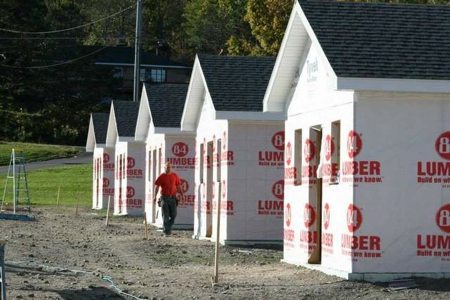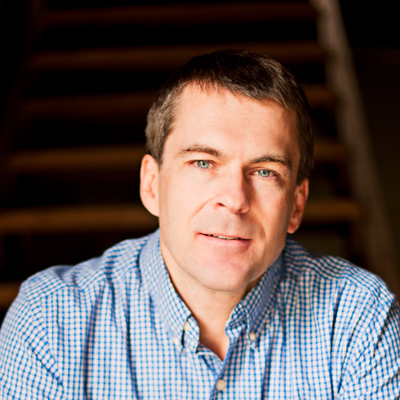
A few years ago, Carmen Guidi read a book that changed his life and, in turn, the lives of many others—from homeless men, women, and children to university students and professors.
Carmen is a hometown boy. He lives just outside the village of Newfield, NY, where he runs Guidi’s Collision Service, a family business started by his father. “If I’m twenty miles from home,” he admits, “I get nervous.”
If he wanted to remain comfortable, Carmen never should have read David Platt’s Radical: Taking Back Your Faith from the American Dream. “You and I can continue with business as usual in the Christian life and in the church as a whole,” Platt writes, “enjoying success based on the standards defined by the culture around us. Or we can take an honest look at the Jesus of the Bible and dare to ask what the consequences might be if we really believed him and really obeyed him.”
“Radical woke me up big time,” Carmen says. “Twenty-six thousand children die everyday? Are you kidding me? Is that real?” Carmen was shocked, inspired, and motivated to do something—anything—but didn’t know where to start. So he phoned Platt. Although getting through to a bestselling author and megachurch pastor isn’t the simplest of tasks, when Carmen determines to do something, he doesn’t give up.
Platt’s advice? “Get out of your context.”
In Carmen’s case, that would mean getting out of Newfield. More specifically, Platt recommended travel- ing to Haiti to assist with ongoing relief efforts following the massive earthquake in 2010. This wasn’t exactly the advice Carmen was hoping for. “I don’t do airplanes,” he responded. That soon changed.
In February 2011, at the age of 46, Carmen flew to Haiti. It was his first time on a plane, and his first time going much of anywhere beyond Newfield. While traveling from the airport to his lodging by bus, Carmen stared out the window and wept. Witnessing the destruction and despair, he says, “I bawled like a baby.” In addition to distributing food, Carmen assisted with the construction of a school and a small orphanage.
One week later, back at home, Carmen wondered how he could continue helping the homeless. Like many people, he was unaware of a homeless problem closer to home. When he began volunteering at a local shelter, however, he heard about “the jungle”—a tent-city settlement of sorts on Ithaca’s west end, just five miles from his home.
When Carmen first visited the jungle, bringing pizza and blankets, he found dozens of men, women, and children of all ages. Some were transient and some were longtime ‘residents.’ Some had jobs and some did not. Some had substance abuse issues but many did not. It was hard to make generalizations about them, except that they were disproportionately men and disproportionately veterans. Although some reported experiencing a degree of community in the settlement, the environment was generally degrading and not at all conducive to human flourishing. The jungle was also an intractable problem for city and county officials—perennial problems included open fires, sanitation issues, and occasional violence.
Carmen didn’t initially set out to end homelessness in Ithaca. He simply set out to befriend a few men. As for helping them, his approach was unconventional. Believing that everyone wants to do something useful, Carmen invited the men to do volunteer work for others. Many responded, eventually contributing hundreds of hours at Ithaca’s new Thrifty Shopper and elsewhere.
Carmen also believes in the power of faith. That’s not to say he expects those he helps to share his faith. But God cares for the poor, Carmen says, and so too should we. He finds inspiration in the New Testament passage that speaks of the risen Christ as blessing those who fed him when he was hungry, gave him hospitality when he was a stranger, and clothed him in his time of need. “Whatever you did for one of the least of these brothers and sisters of mine,” Jesus said, “you did for me.’” For Carmen, this passage is a manifesto for service to the poor.
Among the men Carmen befriended, Dan was especially responsive. They talked together, volunteered together, and read the Bible together. Above all, Dan wanted what Carmen wanted him to want—to get out of the jungle. Those who work with the most needy among us know that such responsiveness is what sustains hope amidst all the disappointments, failures, and setbacks. Carmen was going to get Dan out of the jungle.
When Carmen traveled to Honduras for another short-term missions trip, however, disaster struck. While Carmen was away, Dan hanged himself.
That was it. Carmen cried out in anger to God, asking the most basic questions any of us can ask—“Who am I? What am I here for?” All the interest, care, and concern that had been percolating in Carmen since reading Radical boiled over. “Dear God,” he cried, “I want to do something, but all I know how to do is paint cars.”
Carmen began knocking on doors—social services, mental health services, and housing agencies. Despite various support systems, he found that arranging housing for jungle residents was “almost impossible.” He once spent an entire week at the Department of Social Services trying to arrange housing for a mother and her baby— without success. Witnessing homelessness and despair in Haiti was unnerving, but witnessing it within walking distance of home shook Carmen to his core. He began to wonder aloud, “Am I really in America?”
The problem, Carmen discovered, isn’t money. The problem is that the system is so complicated that homeless men and women can’t navigate it without committed advocacy and assistance. His story brings to mind the trenchant insight of Dr. Seuss: “Unless someone like you cares a whole awful lot, nothing is going to get better. It’s not.”
Carmen spent much of 2012 helping jungle residents secure housing, until just six men remained. Many people believe that some choose to be homeless. Although it’s true that some men prefer the jungle to a homeless shelter, where they have little autonomy, that is not the same as wanting to be homeless. After Carmen gained their trust, even men who initially said they chose to be homeless admitted that they wanted out. “It’s all about trust,” Carmen says.
With all other alternatives exhausted and winter fast approaching, Carmen did what he felt obligated to do. Each time a man was willing to leave the jungle, he purchased a camper and hooked it up on his property—until there were six. “He took them onto his own property,” says Ithaca mayor Svante Myrick, “something that was incredible and, in my understanding, unprecedented in Ithaca. For the first time in literally three generations, the jungle was empty.”
That was one year ago—Christmas, 2012. If that were the end of the story, it would be impressive enough. But that is not the end. In fact, Carmen was just getting started. In 2013, Carmen founded Second Wind Cottages. In close collaboration with Community Faith Partners, a local non-profit organization, he is donating seven acres of land behind his shop and spearheading an army of volunteers to build a small village of winterized one-room cottages. Why build cottages when a dorm-style facility would be more economical? Because it’s not just about putting a roof over their heads. It’s about dignity, and having a cottage of one’s own is actually an attractive alternative to these men.
Constructing the cottages is a daunting task. One has to deal with architects, engineers, building codes, permits, the health department, and of course funding. “I was scared stiff,” Carmen says. Nevertheless, when he determines to do something, he doesn’t give up.
On Saturday, September 21st, 2013, after all the permitting and permissions, Community Faith Partners held a Care Day on site. Volunteers descended by the pickup truck load—one hundred and twenty of them, from local contractors to university students. Since then, thirty local businesses have contributed material and services, including a local architect, civil engineer, lawyer, and construction manager. Fifteen churches and four local artists also support the effort. On December 1st, just twelve weeks after breaking ground, Second Wind held an open house to show off the cottages, which are very nearly complete.
Second Wind Cottages, named by one of the residents, will create a healthy and humanizing alternative to homelessness for men in transition. Residents will pay what they can to live there. Drugs and alcohol will not be allowed. Bible studies and life-skill classes will be offered but not required. Eventually, after two more construction phases, the plan is to have eighteen cottages, a community center, and a social worker on site.
Second Wind Cottages is not exactly a success story. It’s more nearly a faith story. It’s a work in progress and always will be. There will continue to be disappointments, failures, and setbacks of all sorts, and Carmen knows this. “There is nothing romantic about this work,” he says. He would know. The baby with fetal alcohol syndrome that he and his wife Nan adopted from the jungle serves as a daily reminder that the problems associated with homelessness have no quick fixes.
The work of Second Wind Cottages will never be complete because it’s not ultimately about the cottages. It’s about transforming lives. In concept, Second Wind is not so much a settlement as a launching pad—a place of developing healthy habits and useful skills in constructive community. At the open house, pastor Chuck Tompkins put it this way: “Guidi’s Collision Service is full of banged-up cars that leave in much better shape than they arrived. So it is with the men who live here. Our hope and prayer is that through mentoring and the opportunity to experience transformed lives, they too will depart in much better condition.”
David Platt dared his readers to consider the consequences of believing and obeying the Jesus of the Bible. For Carmen, this literally has meant housing the homeless. By giving a second chance to others, however, this Newfield native has discovered a second wind also for himself. When many forty-something men are wondering why they haven’t yet achieved the American Dream of wealth and comfort, Carmen Guidi is redefining the dream. Although he claims not to have cared much about others until recently, today he insists with all the force of his conviction, “There is no such thing as a homeless person. There are people who happen to be homeless, but there are reasons they are homeless. We need to deal with those reasons.”
What can a guy who only knows how to paint cars do for those who happen to be homeless? When he is willing to give of himself—his time, his friendship, and his presence—the answer, it turns out, is quite a lot.
——–
Several students associated with the Chesterton House ministry have contributed to the volunteer Care Days at Second Wind Cottages during the fall 2013 semester.
This article appeared simultaneously in the December 2013 edition of the Herald Examiner.


